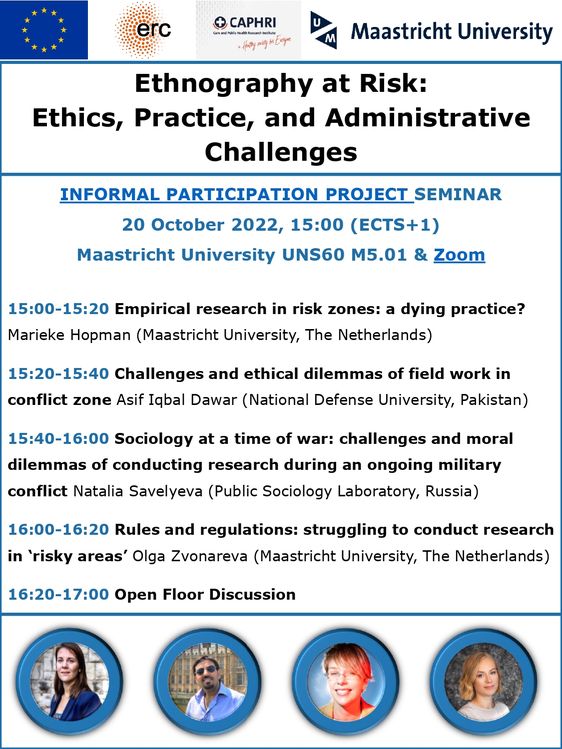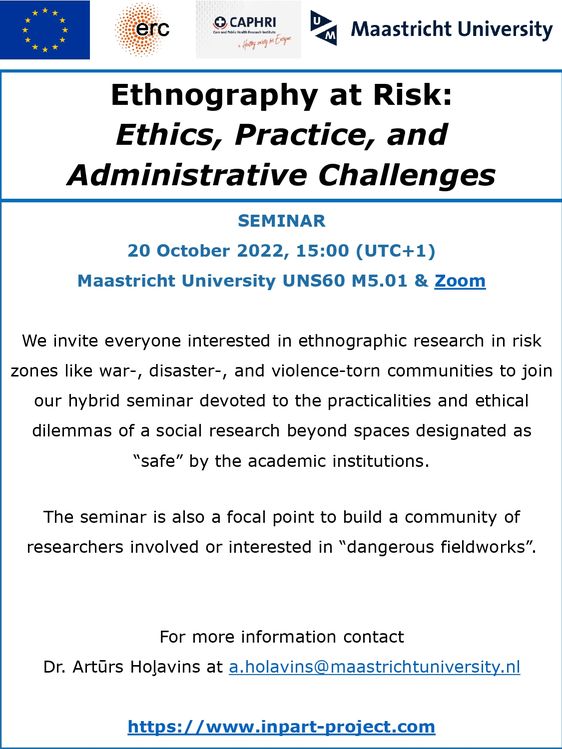Events
Participation and STS Sensibilities: Taking Stock and Moving Forward
Workshop
23 May 2024, Maastricht, the Netherlands
We are inviting interested scholars to submit abstracts for the workshop “Participation and STS sensibilities: taking stock and moving forward”. This workshop aims to explore what taking STS sensibilities seriously would mean for conceiving, understanding, practicing, and valuing public participation [more information on the workshop theme can be found below].
Keynote speaker: Professor Jason Chilvers (University of East Anglia)
Abstracts (500 words) can be submitted here by 20 January 2024.
The workshop is organized by Care and Public Health Institute (Maastricht University, The Netherlands) with support of The Käte Hamburger Kolleg: Cultures of Research and Human Technology Center (RTWH Aachen University, Germany), and Spiral Research Centre (University of Liege, Belgium).
Workshop theme:
The burgeoning field of public participation research has produced numerous concepts, frameworks, methods, and concerns that have traveled across the globe. Science and Technology Studies (STS) scholars have been among those most actively engaged in developing this field. They also have been particularly invested in advocating for making the governance of science and various spheres of life entangled with scientific knowledge and technologies, such as health care, more participatory.
Today, the notion of public participation receives recognition in academic and political debates, and participatory initiatives enjoy remarkable support from many governments, regulators, and funders. It certainly appears that STS scholarship has been highly successful in articulating the urgency of democratizing relations between science, technology, and society, and the centrality of participation in this endeavor. However, nuances of its contributions into understanding and imagining participation appear to remain insulated from dominant approaches to practicing public participation.
In a very general sense, across approximately three decades, scholars from STS and allied fields have moved from developing and evaluating participatory methodologies to raising diverse critiques of particular participatory events and arrangements to considering public participation from a holistic or systemic point of view. This latter move entails understanding participation as an ecosystem of diverse and interconnected ways in which collectives engage in shaping matters of concern. It also entails attending to everyday, mundane, material, and private forms of such engagement, beyond more traditional focus on deliberative and public forms. Yet, mainstream approaches in the practice of public participation tend to remain focused on discrete, mostly talk-based organized participatory exercises, confined to specific questions and narrow topics.
This workshop aims to explore what taking STS sensibilities seriously would mean for conceiving, understanding, practicing, and valuing public participation at the present moment. How to take account of the diversity and multiplicity of ways in which publics participate in articulating and addressing issues of concern? What kinds of, perhaps overlooked, citizen participatory initiatives become visible as a result? How can policy and practice do justice to multiple forms of participation and their relational interdependencies? Importantly, what does such a systemic view of participation mean for understanding and addressing challenges participation faces nowadays in different contexts, including those outside more extensively researched high-income democracies?
Ethnography at Risk: Ethics, Practice, and Administrative Challenges, a hybrid seminar!
The InPart team is happy to announce the hosting of a hybrid seminar “Ethnography at Risk: Ethics, Practice, and Administrative Challenges”. Everyone interested in ethnographies beyond “safe spaces” designated by the academic administration is welcome to join us on October 20, 15:00 (UTC+1) at the Maastricht University room UNS60 M5.01 or in Zoom!
Seminar description: Academic institutions are often reluctant to let research with communities impacted by war, political violence, crime, or disasters. An average ethical committee hesitates to approve ethnographies at “risk zones”. It is so despite actual risks on the ground being subjective, situational, and, quite often, manageable. The @InPart3 project team believes that the communities impacted by social troubles and traumas are the communities to be prioritised by social scientists in their research. In line with this moral conviction, our methodological seminar will summarise arguments to overcome administrative hurdles for doing research in risk zones and addressing practicalities, tactics, and ethical dilemmas associated with it.
More details are available in the info brochure:


Patient Engagement in Drug Development: Moving Beyond Tools and Standardization?
Are you interested in patient engagement in drug development and would like to participate in collective discussion on how to ensure the widespread uptake and successful implementation of the tools and standards available in this field?
Then come join us at the hybrid workshop ‘Patient engagement in drug development: moving beyond tools and standardization?' which will take place on November 18, 2022.
You can find out more about it and register here:
Call for Abstracts for the InPart Panel at EASST 2022 Conference
The project’s panel titled ‘‘Unseen participation? When the uninvited shape matters of collective concern’' was accepted to be a part of EASST 2022 conference ‘‘Politics of technoscientific futures’' that is to be held in Madrid 2022, 6-9 July.
We invite everyone interested to explore together the situations when public participation is discouraged, met with hostility or is not recognised as participation and what happens in such situations. What are the hidden, mundane, non-heroic practices that, nonetheless, feed into maintaining, transforming, or disrupting governance arrangements? How to understand and conceptualise them?
Check out the full description of the panel here. To apply for participation in the panel, follow the guidelines on the conference website. The deadline for applications is 2022, February, 1st.